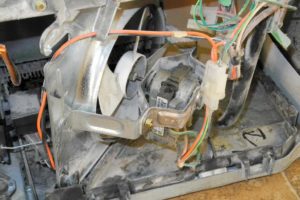Archive for the ‘refrigerator’ Category
Are Small Home Appliances Worth Repairing?
November 28th, 2023
Many people tend to get rid of broken home appliances and buy new ones. However, before throwing it away, opting for a repair would be more economical. Sometimes it can be hard to determine whether the equipment needs a repair or replacement. Therefore, we will offer professional guidance based on certain home appliances. This guide will enable you make the right decision.
Is It Worth Repairing a Microwave?
There are several factors considered before opting for the repair or replacement of a microwave.
When to Repair
During repair, the depreciation of the existing microwave and the cost of replacement is key. If the repair cost is less than the cost incurred to buy it, the repair can be worth it. Moreover, if you paid more money for the microwave, you can repair it if it’s still under warranty. This should be a period of at least 5 years or less.
There are also some minor damages that are worth the repair. When there is an interior light malfunction, you can seek a microwave repair rather than a replacement. Door switch problems are also a minor problem that needs repair. Also, when you have a broken touchpad, a microwave repair can be better.
When to Replace
When your microwave is more than five years old, a microwave replacement is essential. Furthermore, a microwave repair can include hiring trained personnel. In such cases, the cost of repair becomes very high. Therefore, you can opt for a quick replacement.
Other factors that can require a replacement can include loud noises while cooking. When there is a loud buzzing when you hit the start button, this calls for a replacement. Moreover, when the cooking time extends, this can mean that your microwave is old. Therefore, it needs replacement.
Should I Opt for a Dishwasher Repair or Replacement?
A dishwasher is an important equipment in the kitchen. It helps to avoid washing dishes by hand. It is therefore crucial to make the right decision when it comes to a dishashwer repair or replacement. Below are some of the factors you can consider.
Your Dishwasher’s Age
If your dishwasher is more than nine years old, it can be worth replacing it. An old dishwasher will break down more frequently. Therefore, it can be quite costly paying for the repairs.
However, if your dishwasher is less than nine years old, a dishwasher repair can be worth it. At this time, minor issues can be easier to repair at a lower cost. Some of these minor issues can include clogs, broken doors, and door leaks.
Cost
When the cost of a dishwasher repair exceeds the price of a new one, a replacement is economical. This will help minimize the amount of money spent on frequent repairs. A dishwasher repair can be a good choice when its cost is less than that of buying a new one.
Damage of Major Parts
When major parts of a dishwasher break down, this can reduce its efficiency. Therefore, you should opt for a dishwasher replacement. A new dishwasher is more efficient saving on water and energy bills. Some of the features to look at include damage to the energy-efficient motors. Damaged sensors that adjust wash cycles can affect its efficiency. Damaged Eco-modes increase energy consumption reducing the performance of your dishwasher.
Oven Repair or Replacement?
Choosing between an oven repair and a replacement can be challenging. However, understanding the advantages of each of them will help you choose the one you see fit for your oven.
Advantages of an Oven Repair
It can be very cost-effective. In most cases, it is normally cheaper to repair an oven than buying a new one. An oven repair can also help maintain your preferred oven features. Replacing your oven means you will have to adjust to new features and lose your preferred ones.
Advantages of an Oven Replacement
A newer oven is more energy efficient. This helps to minimize utility bills. The more oven repairs done, the less efficient it becomes. Therefore, for an efficient oven, replacement is crucial.
Moreover, a new oven comes with a warranty. This provides you with free oven repairs if anything happens within the specified period.
Finally, both the repair and replacement of your home appliances need qualified personnel. Avoid doing it yourself as this can cause more damage. An expert in the field will ensure that your appliances are working properly. They will also advise on the right time to go for a repair or a replacement.
Posted in dishwasher, disposal, freezer, general, microwave, refrigerator, seasonal, stove, washing machine, wine cooler | Comments Off on Are Small Home Appliances Worth Repairing?
How Much Does Refrigerator Repair Cost?
September 13th, 2023
The average refrigerator lasts between 10 and 15 years. There are some refrigerators that can last for over 20 years. However, your refrigerator will need to be repaired at some point. Refrigerator repair usually costs $200 to $300, but there are several factors that determine how much you have to pay.
What Factors Impact Refrigerator Repair Cost?
The Age of Your Refrigerator
If you have an older refrigerator, then you can expect to pay more to have the refrigerator repaired. Your refrigerator may have a part that needs to be replaced. It is much harder to find older parts, which is why you will have to pay more.
The Extent of the Damage
Minor problems are easier to repair. In fact, a technician may be able to repair a minor problem in less than an hour. However, it can take several hours to repair a major problem. Because there is more labor involved, you will have to pay more for a major repair.
The Refrigerator Brand
The type of refrigerator that you have will affect how much you have to spend on repairs. If you have a high-end brand, then your repair will likely cost more. High-end brands are more expensive, so the cost of replacing a damaged part will cost more.
How Much You Can Expect to Pay for Specific Types of Repairs
Gasket
If your refrigerator is not getting as cold as you would like it to be, then the problem may be caused by the gasket. The gasket may be letting the cold air go out of your refrigerator. It can cost anywhere from $50 to $200 to replace a gasket.
Thermostat
The thermostat is what controls how cold the refrigerator will get. If the thermostat is not working the way that it should, then the temperature of the refrigerator will fluctuate. Your food will end up spoiling. The cost of replacing a thermostat ranges from $200 to $400.
Compressor
The compressor is what helps regulate the flow of refrigerant. Your refrigerator cannot stay cool without the refrigerant. Unfortunately, if there is something wrong with your compressor, then you can expect to pay a lot of money to replace it. The cost ranges from $200 to $400.
Fan Motor
There are two fan motors in your refrigerator. One is located in the condenser, and the other is located in the freezer. Your refrigerator may get warm if the fan motors are not working the way that they should. Replacing a fan motor can cost anywhere from $200 to $250.
Defrost Heater
The defrost heater melts the ice off of the evaporator coils. It costs $100 to $200 to replace a defrost heater.
Is Repair or Replacement the Better Option?
In many cases, repair is the most cost-effective option. However, you may want to replace your refrigerator if it is old. You may also want to replace your refrigerator if the repair costs are more than half of what a new refrigerator will cost. Keep in mind that a new refrigerator costs between $1,000 and $3,000.
Posted in refrigerator | Comments Off on How Much Does Refrigerator Repair Cost?
Most Common Refrigerator Problems
August 1st, 2022
Your refrigerator is one of the most important appliances in your home. You use it multiple times every day, and a malfunction could mean losing all the food in it. If your refrigerator isn’t working right, it could also mean health problems for your family. In this post, we’ll explore some of the most common problems refrigerators have, and what you can do about them.
Refrigerator Leaking Water
One of the most common problems with refrigerators is the appearance of water on the floor near the fridge. Most people assume that the fridge is leaking water. Sometimes that’s the case, but sometimes it’s not. Refrigerators are designed so that condensation accumulated in the interior of the fridge drains through a drain hole and then into a drain pan underneath where it evaporates. So the water is a symptom, but you need to find the cause. There are several possibilities:
Refrigerator’s Position
If the refrigerator is completely level or tipped slightly forward, the water may not be able to flow into the drain. All you have to do is adjust the front legs so that the refrigerator tips back slightly. That tilt also makes the door swing closed after you turn away from the refrigerator. Be careful when adjusting your refrigerator, though. It is designed to be nearly level, and tipping it too much can create significant problems with other systems.
Refrigerator’s Seal
When your refrigerator doesn’t seal properly, it runs constantly causing excessive condensation on the coils, and water overflows the drain pan. Check the rubber door seals on your fridge and freezer to make sure you’re getting a proper seal. If you find a problem, wash the seals with warm water and soap and apply a thin film of petroleum jelly.
Damaged Drain Pan
The problem could be as simple as a cracked or damaged drain pan. Remove the drain pan from underneath your refrigerator where it is located. If it has a crack or is otherwise damaged, contact Dave’s Appliance about getting a replacement as soon as possible.
Refrigerator Freezing Instead of Chilling
Another common problem is when food is freezing instead of cooling. Most often, you can determine the reason for this problem and perform the refrigerator repair yourself.
Temperature Gauge
If the milk is suddenly frozen, then the most likely cause is that the temperature gauge has been accidentally bumped and is set too low, or too cold. That’s easily rectified. Just set the temperature to medium or 5. If you can designate an actual temperature, set it to 40ºF.
Freezer Seals
If the freezer is part of the refrigerator unit (either above or below) rather than a side-by-side design, it may be that the freezer seals are not functioning properly. The same techniques outlined above for dealing with the seals of the refrigerator doors will fix this problem, too; warm soapy water and some petroleum jelly.
Dirty Coils
If the coils on your fridge are dirty or dusty, then the compressor needs to work harder and longer to keep the freezer temperature constant. When this happens, the refrigerator can overcool and freeze food and drinks.
These are the most common issues with refrigerators, and you can deal with many of them yourself. If the trouble persists or your particular problem isn’t described here, it’s best to call Dave’s Appliance. Importantly, if you think your fridge might be leaking refrigerant rather than water, call Dave’s Appliance immediately. Refrigerant is a toxic material and you need to address this issue as quickly as possible in order to avoid subsequent health risks to you and your family.
Posted in appliance repair, refrigerator | Comments Off on Most Common Refrigerator Problems
Does Room Temperature Affect My Refrigerator?
June 1st, 2022
With the kind of heat and humidity we’ve been dealing with in Wisconsin this summer, the temperature inside your home may vary greatly. Or maybe you have a fridge in your unheated garage or uninsulated shed outside. Does room temperature affect your refrigerator? That’s an important question, and while refrigerators generally work fine in spaces that have a wide range of temperatures, there are certain considerations you should know.
Extremes Damage Refrigerators
The temperature of the room that a refrigerator is in should be between 60ºF and 95ºF. That’s a really wide range, and you might think there’s no way your refrigerator could be in a situation where the ambient temperature is either that high or that low. But you live in Wisconsin. If you don’t have AC, or you do and it breaks down, the inside temperature can easily get above 95ºF. In the winter, having a refrigerator in an unheated space simply turns it into a freezer. Extreme temperatures can damage the compressor or sealed system. Below 32 degrees Fahrenheit, the oil could become thick and not circulate properly. Above 110 degrees Fahrenheit, the oil could overheat and break down.
Fridges in Hot Temperatures
If the refrigerator is located in a room where the temperature is over 90ºF and it is opened frequently, then the efficiency will decrease significantly. When the outside temperature is so warm, it can cause other problems, too. The consistency of the cooled temperature inside the unit may vary widely and your food may spoil more quickly.
Fridges in Cold Temperatures
Having a refrigerator in a partially heated space might seem like a good compromise. While the unit may not actually break down, you might reconsider that choice. Refrigeration systems rely on the boiling of refrigerant under pressure and heat. When the ambient temperature is below 60ºF, it takes more energy to make the refrigerant boil and change into a vapor. And the energy consumption increases with the decreasing temperature until at 32ºF, there’s no cooling capacity at all. So even when it continues to cool, you’re spending a lot more money than you need to.
Other Considerations
Remember that the room temperature can be quite different from the outside temperature. Your well insulated garage can be 10 – 20 degrees colder or hotter than outdoors. If you do decide to have your refrigerator in a place that isn’t ideal, take steps to mitigate the loss of efficiency. Your refrigerator placement can help with that. Your fridge shouldn’t be pushed against the wall. It needs a little space behind it so that air can circulate freely and the heat from the condenser can dissipate. Keeping the grill clean and the door seals tight ensures that it’s working at peak efficiency too.
If you’re wondering whether room temperature affects your refrigerator, the answer is yes. You probably don’t have it in a space where the extreme temperatures will cause a breakdown, but you should be aware that its efficiency will be affected by the ambient temperature. If you have any continuing concerns, call the experts at Dave’s Appliance; we’ll be glad to help.
Posted in appliance repair, refrigerator | Comments Off on Does Room Temperature Affect My Refrigerator?
Is Your Appliance Worth Repairing?
May 13th, 2021
Appliances help us keep our lives on track. Where would we be without our refrigerator/freezer, washing machine, dryer, dishwasher, microwave, and garbage disposal? When any one of these stops functioning, it can quickly turn from an inconvenience into a disaster. Your immediate impulse might be to replace the appliance that is broken. But is that always the right option? Here is a quick guide to help you decide whether your appliance is worth repairing.
How Much Would It Cost?
Generally, the larger the appliance the costlier it is. So if your stove breaks, you’re looking at a major investment to buy a new one. But if your microwave goes, you can purchase one for under $75. Consumer Reports advises that if the cost to repair your appliance is greater than half the cost of a new one, it makes sense to replace it. Obviously you won’t know how much the repair would cost without consulting an appliance repair service. At Dave’s Appliance, our experts can diagnose your appliance’s problem and give you an estimate for the repair. With all of that information, you can make an informed decision.
Which Appliance Is it?
Other than cost, you have to consider how much you value your current appliance. Your refrigerator/freezer may have external ice and water dispensers, pull-out shelving, and other features you really appreciate. Your washer and dryer may fit just perfectly into the space in your utility room. Maybe you love to cook and bake and your stove suits you perfectly. It might even be that your appliances coordinate with your decor. These are definitely legitimate reasons to hesitate about replacing them when they break. Again, a visit from one of the friendly members of Dave’s Appliance team will help you understand the extent of your problem.
How Old Is It and Is It Still Under Warranty?
Major appliances like refrigerators or chest freezers often last from 10 to 20 years. Other appliances like trash compactors have an average life span of about 6 years. Most appliances also come with warranties, and often those can be extended if you choose to do so. When an appliance breaks down, it would be a good idea to find out if its warranty is still in force. If it’s not, check to see what the average life span is for your brand of that particular appliance.
What’s The Environmental Impact?
Often, the environmental impact of repairing or replacing isn’t considered at all. But perhaps you should think about it. If your appliance is old and inefficient, it may be using a lot of electricity. That’s bad for the environment and bad for your utility bills. If your appliance was made after 1992, it should have an Energy Star Rating to let you know how efficient it is. You can compare it to current appliances’ efficiency. On the other hand, your old appliance can’t just be thrown out. Major household appliances are banned from landfills in Wisconsin and the state urges that they be reused or recycled. In many places in Wisconsin, appliances are not picked up at the curb with other recyclables, nor are they accepted at many general recycling drop-off sites. It may be the more environmentally-responsible choice to repair rather than replace.
Whatever your appliance concern, the experts at Dave’s Appliance will be able to tell you what the problem is and help you decide whether or not it’s worth repairing. Give us a call.
Posted in appliance repair, clothes dryer, dishwasher, disposal, freezer, general, microwave, refrigerator, seasonal, stove, washing machine, wine cooler | Comments Off on Is Your Appliance Worth Repairing?
Is it Worth Getting a Fridge/Freezer Repaired?
May 13th, 2021
Your refrigerator/freezer unit is a major appliance, and therefore a major investment. And it’s also a major problem when it breaks down. After all, you can’t have all the food in your fridge/freezer spoiling, so it feels pretty desperate when it stops working. Contact the professionals at Dave’s Appliance to get a quick diagnosis of the problem. Once you know what’s wrong, you can consider which course of action to take, repair or replacement. Here’s a brief guide.
Fluctuating Temperature
The food in your fridge isn’t cool enough and you’re finding that it spoils much too soon. Maybe the ice cream in your freezer is always soft serve. That’s not good. On the other hand, you might find your milk with frozen shards in it and your ice cream requires a chisel to extract it from the container. Fluctuating temperatures can be a really small problem, or they can be a really big one. The problem might be as minor as the thermostat getting bumped. Make sure that no family members are trying to “fix” the problem by repeatedly resetting the temperature. Even if the thermostat itself is broken, that’s a relatively minor repair. At the other end of the spectrum, fluctuating temperature may indicate a problem with the compressor or motor. The experts at Dave’s Appliance will be able to get to the source of the issue, and can let you know if it’s worth repairing your fridge/freezer.
Water On The Floor
Water on the floor by your refrigerator might indicate a big issue with your appliance, and even if it doesn’t, it’s a safety hazard for you and your family. You don’t want anybody slipping on the water and getting injured. It doesn’t necessarily mean a costly repair, however. It might be that the doors aren’t shutting properly, possibly due to a faulty latch; the seals could be the culprit. The water could be coming from the accumulated condensation within the unit not draining as it should. It could be that the hoses that go from the compressor to the drip pan are cracked and leaking–an easy, inexpensive fix. It might be that the drip pan itself is broken. Again, that’s not a big deal. It’s important to find out the exact cause of the problem, though, and Dave’s Appliance can help you there.
Loud Motor/Funny Noises
All refrigerator/freezers make some noise. The motor needs to come on to run the condenser. If you’re hearing your refrigerator running continuously, that could indicate something seriously wrong. You should call one of the experts at Dave’s Appliance to find out more. Likewise, if you’re hearing your refrigerator running loudly when you’re not even in the kitchen, that’s another good indicator of a significant issue. Someone from Dave’s Appliance team can diagnose the problem and let you know whether or not you should repair it.
Age and Efficiency
Other factors that you should consider are the age and efficiency of your unit. If you have a refrigerator that was made before 1992, it won’t even have an energy efficiency rating and you can bet that it’s costing you more in electricity than it should. Otherwise, your unit should have an Energy Star rating. You can compare it with current ones and make an informed decision. The kind of fridge/freezer you have also has an impact on how long it lasts. It varies by design and by brand. The general rule of thumb is that if it is over 5 years old, you should investigate the average lifespan of your particular unit. Of course, if your fridge/freezer is under warranty, you should certainly get it fixed.
When your fridge/freezer isn’t working as it should, call Dave’s Appliance and make sure you know exactly what is wrong. Once you do, you can make an informed decision about whether you should repair it or replace it.
Posted in freezer, refrigerator | Comments Off on Is it Worth Getting a Fridge/Freezer Repaired?
Should I Repair or Replace My Broken Refrigerator?
April 8th, 2021
When considering whether to repair or replace a malfunctioning or broken refrigerator, it’s best to have a little guidance. If the refrigerator has a history of breakage or poor performance, or if it’s quite old and inefficient, or if you’re just plain tired of what you have for any number of reasons not having necessarily to do with performance, such as capacity or layout or features, that may make your decision easier. You might also decide to replace your refrigerator because you are moving or remodelling, and it doesn’t fit a particular space or decor. That said, this article is for those who want to have some clarity as to whether it’s better to repair a refrigerator that you’d rather not replace if you don’t have to.
Replacing a refrigerator is a somewhat expensive proposition, if quality and features are factors, and most buyers will invest considerable time and effort into scoping out the alternatives. Luckily, refrigerators are pretty low-maintenance as major appliances go, and those manufactured by quality brands are liable to have reasonably long warranty coverage, which can be extended, usually by an insurance company associated with the sellers for added peace of mind. Generally speaking, you should expect for a new refrigerator to last from 10 to 20 years.
That said, the consequences of a broken or malfunctioning refrigerator can be significant, particularly if you use the freezer to store expensive cuts of meat. If that’s the case, it’s not a bad idea to keep a high-quality cooler on hand, just in case your refrigerator breaks or the power goes out for an extended period of time, or just for when you wish to defrost or deep clean the unit.
As with any other appliance, the more features and conveniences there are, the more there is to break. It’s nice to have an ice and water dispenser on the outside of the fridge, but it’s one of the most breakage-prone parts of an expensive fridge. I know I’m one of the people who just limped along without the water dispenser for awhile every time it stopped functioning the last time I had a refrigerator with one. Some people prefer to have dedicated ice makers and tap-attached water filtration at the sink for just this reason. If something goes wrong, it’s just that smaller appliance that’s affected.
All that said, here are the situations in which you might consider replacing rather than fixing your refrigerator.
Overheating
Your refrigerator compresses and expands gas to absorb and move heat. That’s why you’ll feel heat emitted out of the bottom of your fridge if you place your toes down there. The compressing is done by a motor, and the motor itself may overheat. Relatedly, some compressor motors are louder than others. You can hear them kick in when you leave one of the doors open long enough to trigger the thermostat. That sound may also be accompanied with a beeping to alert you that you should close the door as soon as possible to preserve the temperature.
While it’s normal to feel some heat when you touch the back of your fridge (and there should be sufficient space behind and above to permit the heat to radiate away without building up too much), if your fridge becomes positively hot to the touch such that you have to pull away for fear of burning yourself, there’s either something wrong with the thermostat or the other mechanical elements of the unit. The coils in the back that radiate the heat that’s transferred from inside to outside your refrigerator are insulated, but if it gets hot back there try first to remove any dust or grime that has accumulated on the coils. A paint brush and vacuum attachment work well for this operation. If that doesn’t help, call a repairman to come look. It may be that your refrigerator has leaked some coolant, which can be replaced, but it might be something more significant.
Overfreezing
On the other hand, your freezer unit may be positively freezing over. Obviously, you want your frozen food frozen, but on the other hand you shouldn’t have to see the foods inside turning into a glacier. If it’s starting to look like a new ice age in there, check that the temperature isn’t set to max cooling. Move anything you want to keep into alternate cold storage (such as a large cooler, or, if you live where it gets cold in winter, you can use those temperatures), throw down some old towels to absorb the meltage, and unplug the unit to let it defrost thoroughly before plugging it back in. This would be the ideal time to try cranking the freezer setting back a little to see whether that suffices. Most modern refrigerators have auto-defrost, so this recommendation largely applies to older models.
If the problem persists or gets worse, it’s best to have a pro get a look at your refrigerator to see what the issue may be. The friendly repairmen at Dave’s appliance will probably be able to sort it out pretty quickly.
Leakage or Extreme Condensation
This may be a simple matter of the seal around your refrigerator or freezer door. If heat is escaping, ice may be melting in the freezer and causing leakage. Alternately, moist air from outside might be entering the refrigerator and condensing, then leaking out of a bad seal. Check the stripping all the way around the door. You may be able to reaffix it yourself, or buy new stripping if you’re handy. But leakage near the refrigerator can pose a health hazard, either by slipping or through accidental electrocution, so BE CAREFUL.
Alternately, the drip pan may be broken or out of place, or hoses may be broken or kinked, or a malfunctioning latch or other problem may be preventing a door from closing properly. Often these are the culprits if you find the inside of your refrigerator is wet to the touch and drips.
Your Refrigerator Runs Loud
Some of us are just more sensitive to this kind of noise than others, but if it seems to have gotten louder than you remember, you can pull the plug and then replug it in, and this may take care of any buzzing. If not, give your repairman a call. Your refrigerator could be on its last legs.
Food Spoilage
Obviously, this gets expensive quickly, and it can pose a health hazard. Check to make sure that door latches and stripping are good, and that your setting hasn’t been dialed way back. Check the back of the unit for overheating, as mentioned above.
In Conclusion
If your refrigerator is older, say 12+ years, and/or if it’s needed significant repair one or more times before, or if it’s not efficient, or you’re ready to move on, a new refrigerator may be your best option.
If you’d rather not replace it, and if you’re handy, you can look for online resources to help you take a stab at fixing such problems yourself, but when in doubt, call on the experts at Dave’s Appliance. They’ll fix your refrigerator if that’s the best course of action, or recommend a new one if that’s your better bet given your situation. And Dave’s carries all the best value, top quality brands. Give them a shout if your refrigerator is having troubles. They’ve seen it all. They’ll get it straightened out for you.
Posted in refrigerator | Comments Off on Should I Repair or Replace My Broken Refrigerator?
Does Room Temperature Affect My Refrigerator?
August 4th, 2020
You may be considering putting a second refrigerator out in your unheated garage. Or you might worry about your refrigerator’s efficiency in the hot, humid Wisconsin summers. Whatever your situation, it’s important to know whether room temperature affects your refrigerator.
Extreme Temperatures Can Damage Fridge
The temperature of the room that a refrigerator is in should be between 60ºF and 95ºF. That’s a really wide range, and you might think there’s no way your refrigerator could be in a situation where the ambient temperature is either that high or that low. But you live in Wisconsin. Extreme temperatures can damage the compressor or sealed system. Below 32 degrees Fahrenheit, the oil could become thick and not circulate properly. Above 110 degrees Fahrenheit, the oil could overheat and break down.
Refrigerator Function in Cold Temperatures
Having a refrigerator in a partially heated space might seem like a good compromise. While the unit may not actually break down, you might reconsider that choice. Refrigeration systems rely on the boiling of refrigerant under pressure and heat. When the ambient temperature is below 60ºF, it takes more energy to make the refrigerant boil and change into a vapor. And the energy consumption increases with the decreasing temperature until at 32ºF, there’s no cooling capacity at all.
Refrigerator Function in Hot Temperatures
If the refrigerator is located in a room where the temperature is over 90ºF and it is opened frequently, then the efficiency will decrease significantly. When the outside temperature is so warm, it can cause other problems, too. The consistency of the cooled temperature inside the unit may vary widely and your food may spoil more quickly.
Other Considerations
Remember that the room temperature can be quite different from the outside temperature. Your well insulated garage can be 10 – 20 degrees colder or hotter than outdoors. If you do decide to have your refrigerator in a place that isn’t ideal, take steps to mitigate the loss of efficiency. Your refrigerator placement can help with that. Your fridge shouldn’t be pushed against the wall. It needs a little space behind it so that air can circulate freely and the heat from the condenser can dissipate. Keeping the grill clean and the door seals tight ensures that it’s working at peak efficiency too.
If you’re wondering whether room temperature affects your refrigerator, the answer is yes. You probably don’t have it in a space where the extreme temperatures will cause a breakdown, but you should be aware that its efficiency will be affected by the ambient temperature. If you have any continuing concerns, call the experts at Dave’s Appliance; we’ll be glad to help.
Posted in refrigerator, seasonal | Comments Off on Does Room Temperature Affect My Refrigerator?
Refrigerator Maintenance: 5 Ways to Avoid Fridge Repair Costs
July 9th, 2020
Keeping your refrigerator in good working order prevents many issues from developing. It also maintains your family’s health by properly cooling your food. If you’re worried that you can’t possibly perform maintenance on your refrigerator, that’s understandable. After all, it’s a major appliance with different mechanical parts, including refrigerant fluid that can be toxic. However, there are simple tasks you can do with confidence. Here are 5 ways to avoid fridge repair costs:
1. Keep the Drain Clear
Every refrigerator has a small drain hole to allow water that condenses on the inside of the fridge to drain out into a drain pan underneath it. That drain hole can easily become clogged if any food particles get stuck in it. Clearing the drain hole may be as simple as removing obvious food particles. Or you may need to use a thin snake followed by baking soda and hot water. If that’s necessary, you should unplug the refrigerator and take the vegetable drawer out for easier access. Then use the snake, and finally, sprinkle 2 teaspoons of baking soda down the hole, followed by 2 cups of hot water. You might need to use a turkey baster to direct the hot water properly. Always finish by emptying the drain pan.
2. Check the Temperature
The interior of your refrigerator should be about 40ºF and the temperature gauge should be set at medium or 5 to achieve that temperature. That gauge can easily get knocked out of position, so periodic checks are a good idea. It’s also wise to have an independent internal refrigerator thermometer in your fridge. That way, you can monitor that the temperature gauge is working properly. Just put it on the bottom shelf (not in the crisper) toward the back where it won’t get in the way.
3. Inspect the Door Seals
Check the rubber door seals on your fridge to make sure you’re getting a proper seal. Look for any cracks or pitting. The door seals should be flexible. If you find a problem, wash the seals with warm water and soap and apply a thin film of petroleum jelly. When your fridge doesn’t seal properly, it runs constantly causing excessive condensation on the coils, and water overflows the drain pan. Remember the freezer door seals too.
4. Check the Drain Pan
The drain pan is underneath your refrigerator and allows the water that condenses inside the fridge and drain out to evaporate. If your drain pain becomes cracked or damaged, then instead of evaporating, that water will simply pool under your fridge, and eventually leak out. Remove the drain pain and look at it carefully to see if there are any obvious problems. You might even run water into it and watch whether any escapes. If the drain pan is damaged, just call Dave’s Appliance, and we can get you a new one quickly.
5. Clean the Coils
If the coils on your fridge are dirty or dusty, then the compressor needs to work harder and longer to keep the freezer temperature constant. When this happens, the refrigerator can overcool and freeze food and drinks. This task is a little more complicated because you need to turn off your refrigerator and remove a panel to expose the condenser coils; but the good news is that you shouldn’t need to clean the coils more than twice a year. Once the coils are exposed, simply use a soft-bristled brush to get as much dirt off as possible, then vacuum it up. With a narrow nozzle attached to your vacuum, you can do a pretty thorough job of it.
Simple refrigerator maintenance is key to prolonging the life of your fridge and ensuring that the food your family eats is properly cooled. Maintenance also prevents problems and potentially costly repairs.
At Dave’s Appliance, we want to partner with our customers to keep the appliances in your home running smoothly.
Posted in cleaning, refrigerator | Comments Off on Refrigerator Maintenance: 5 Ways to Avoid Fridge Repair Costs
Be Aware of the Signs Your Refrigerator Might Need a Repair
June 17th, 2019

1. Water on the Floor
When dealing with a leaky refrigerator, don’t be surprised to discover puddles on the floor. This is a problem that needs to be fixed as soon as possible. You definitely don’t want any water damage to occur. The cause of the leaking can stem from a few different issues, including a worn door seal and a clogged drain tube. (more…)
Posted in refrigerator | Comments Off on Be Aware of the Signs Your Refrigerator Might Need a Repair








